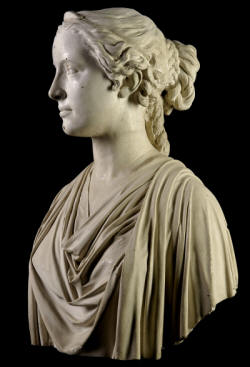

Queer Places:
Mount Auburn Cemetery
Cambridge, Middlesex County, Massachusetts, USA
 Anna Hazard Barker Ward (October 25, 1813 – December 29, 1900) was the
daughter of Jacob Barker of New Orleans, who made, lost, and remade fortunes.
A woman of great beauty and grace, Anna remained
Margaret Fuller's lifelong
friend even after Anna married Samuel G. Ward, whom Fuller also loved. The courtship of Anna Barker and Samuel Ward has been immortalized by the author Eleanor M Tilton in her article titled "The True Romance of Anna Hazard Barker and Samuel Grey Ward", published in the journal Studies in the American Renaissance in 1987.
Anna Hazard Barker Ward (October 25, 1813 – December 29, 1900) was the
daughter of Jacob Barker of New Orleans, who made, lost, and remade fortunes.
A woman of great beauty and grace, Anna remained
Margaret Fuller's lifelong
friend even after Anna married Samuel G. Ward, whom Fuller also loved. The courtship of Anna Barker and Samuel Ward has been immortalized by the author Eleanor M Tilton in her article titled "The True Romance of Anna Hazard Barker and Samuel Grey Ward", published in the journal Studies in the American Renaissance in 1987.
Anna Hazard Barker was born in Cambridge, Middlesex, Massachusetts, on October 25, 1813 to Jacob Barker and Elizabeth Hazard. Anna Hazard Barker married Samuel Gray Ward and had 4 children: Anna Barker Ward (1841-1875), Lydia Gray Ward (b. 1843), Thomas Wren Ward (1844-1940), Elizabeth Barker Ward (1847-1920).
In 1837, Boston-born Anna Hazard Barker toured Europe with friends. While there, she met her future husband Samuel Gray Ward, who worked for a British banking firm. When she visited Hiram Powers’s studio in Florence, he offered to model her portrait free of charge. He was still working on this when Anna returned to America, and so he asked her to have a cast taken of her face and sent to him for reference. Powers felt that her features embodied the essence of womanhood, and her portrait was the inspiration for his first ideal bust. The artist’s second daughter was born while he was working on this piece, and named Anna Barker Powers in honor of Powers’s friendship with Mrs. Ward.
Margaret Fuller, a friend and protegee of Ralph Waldo Emerson, was one of the most brilliant and scholarly American women of the period, and certainly the first to theorize on the subject of same-sex relationships. While living in Jamaica Plain, she wrote a revolutionary feminist work titled Woman in the Nineteenth Century (1845), in which she states, "The growth of Man, is two-fold, masculine and feminine", meaning that everyone possessed both masculine and feminine qualities. Fuller's relationship with her young cousin, Anna Barker, was described by one historian as "Margaret's most cherished romantic love." After Anna Barker's marriage in 1840, Fuller reminisced: "She loved me too... that night when she leaned on me, and her eyes were such a deep violet blue like the night, as they never were before, and we felt such a mystic thrill, and knew what we had never felt before." Fuller was firm in her belief that "it is so true that a woman may be in love with a woman, a man with a man."
She passed away on December 29, 1900 in Cambridge, Middlesex, Massachusetts.
My published books: